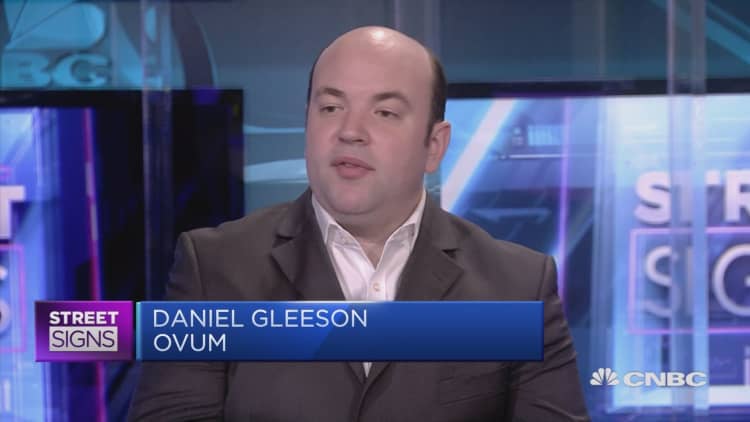
Apple has introduced a technology called eSIM into its latest iPhones that could open new revenue streams for the tech giant, analysts have told CNBC — but it will have to balance its relationship with major carriers around the world.
The iPhone XR, XS and XS Max will all have dual-SIM capabilities. This means that a user will be able to have two separate phone lines. One will be via a traditional physical SIM card and the other will be an eSIM or embedded SIM.
The technology will theoretically allow a user to change carriers without having to order a new SIM card or go to a shop. Instead, they could just sign up digitally.
This is useful if you're traveling abroad and want a temporary local number. Or if you want to have your work and personal numbers on the same device.
Dual-SIM hasn't really been a popular option in countries including the U.S. and U.K., but is liked by consumers in emerging markets such as India, a country where Apple has had a small market share. Dual-SIM could prove very popular for users in these markets. Apple has had eSim technology previously in its iPad Pro and is not the first smartphone maker to offer it.
But the eSIM option could open new business models for Apple, according to analysts.
"The eSIM will be controlled by Apple and it can dictate which carriers to partner with, support and show relative mobile plans," Neil Shah, research director at Counterpoint Research, told CNBC by email on Thursday.
"So Apple can be the gatekeeper now since it will have control over eSIM. Thus it will demand a revenue cut for the activations happening through eSIM."
Shah said that Apple could also offer its own tariffs that are white-labeled by other mobile providers and charge a "premium for the convenience and ease of activating a new plan."
Ian Fogg, vice president of analysis at OpenSignal, backed up that view in a LinkedIn post Thursday, saying Apple could introduce its own data tariffs "to take charge of more of the end-to-end mobile network experience."
However, this is unlikely because of the complexities of doing so and the reliance on mobile networks.
"Apple's ability to deliver the complete mobile network experience will remain limited even if it offers its own mobile tariffs using eSIM, because of Apple's continued reliance on wholesale services from the mobile operators which own both spectrum and network infrastructure," Fogg said.
"The mobile operators are not going away any time soon. Apple knows this and will continue to work with them."
Still, Apple's move with the eSIM is likely to worry mobile carriers because it could allow users to switch providers quickly, heating up competition in what is a tough market for many operators.
"Introducing dual SIMs in all markets is a bold move by Apple and something that will give mobile operators a lot to think about," Ben Wood, chief of research at CCS Insight, said in a note Wednesday.
"The potential for new business models is limited while Apple continues to offer a physical SIM card slot alongside the eSIM capability. But, if it eventually decides to get rid of the physical SIM it will have significant implications for how customers buy airtime in the future."
But it's hard for carriers to ignore right now and Apple has done well to get major names on-board. In the U.S., AT&T, T-Mobile and Verizon are all signed up. In India, major telcos Reliance Jio and Airtel will offer services.
Neil Campling, co-head of the global thematic group at Mirabaud Securities, told CNBC by email on Thursday: "Carriers can't complain as they need to offer Apple devices, but Apple is just making it easier for users — and ease of use has always been the MO of Apple products. What this will likely do is accelerate price competition at the carrier level and could increase churn rates… which is never a good thing for carriers, of course."


